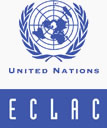The UN Economic Commission for Latin America and the Caribbean (ECLAC) released a revised document on a regional agreement to ensure implementation of Principle 10 of the Rio Declaration (access to information, public participation and justice in environmental matters), based on feedback from representatives from 20 Latin American and Caribbean countries at the Second Meeting of the Negotiating Committee of Principle 10.
 15 December 2015: The UN Economic Commission for Latin America and the Caribbean (ECLAC) released a revised document on a regional agreement to ensure implementation of Principle 10 of the Rio Declaration (access to information, public participation and justice in environmental matters), based on feedback from representatives from 20 Latin American and Caribbean countries at the Second Meeting of the Negotiating Committee of Principle 10.
15 December 2015: The UN Economic Commission for Latin America and the Caribbean (ECLAC) released a revised document on a regional agreement to ensure implementation of Principle 10 of the Rio Declaration (access to information, public participation and justice in environmental matters), based on feedback from representatives from 20 Latin American and Caribbean countries at the Second Meeting of the Negotiating Committee of Principle 10.
The Second Meeting, held in October 2015, aimed to negotiate the substantive content of the preamble and Articles 1-10. However, delegates only addressed the agreement’s Preamble and Article 1 (objective of the Agreement) and Article 2 (definitions of access rights, competent authority, disadvantaged groups, environmental information, among others). According to ECLAC, the slow pace of the negotiations “could be attributed to three Latin American countries who indicated that time did not permit them to engage in national consultations on the Preliminary document.” Consequently, participants agreed to draft a second version of the text—the document released by ECLAC—to negotiate Articles 2-10 during a Third Meeting of the Negotiating Committee in April 2016, in Punta del Este, Uruguay. The revised document presents text suggestions and alternatives with the supporting country names. It points out agreed text and text proposed after the meeting.
During the meeting, participants recognized, inter alia, the importance of a binding instrument on access rights in the implementation of the 2030 Agenda for Sustainable Development and its Sustainable Development Goals (SDGs). They noted, for example, that the agreement could help to establish capacity-building mechanisms and partnerships that will facilitate implementation of access rights.
A group of UN human rights experts expressed their strong support for the negotiations in an open statement, describing them as “one of the most important steps every taken to protect and promote environmental democracy at the international level…it will provide a model for other countries and regions.” The experts, representatives of the UN Special Procedures, also applauded the negotiation’s transparent process, including “the ability of the public to speak at any moment of the discussions, subject to the Chair’s discretion.”
In addition, observing that most of the countries have expressed their intention to conclude a legally binding instrument, but “have not yet adopted a formal decision on the question,” the experts urge adoption of a treaty or other legally binding instrument to “promote the effective implementation of access rights and sustainable development.” The statement stresses, “When the people most affected by environment and development policies including indigenous peoples, whose livelihoods and cultures often depend on access to their lands and resources, and women, who are often the primary caregivers in the family, can exercise their human rights to information, participation and remedy, then the policies are most responsive, fair and effective.” [ECLAC Press Release] [Second Version of the Negotiating Document] [Statement by UN Experts on ECLAC Negotiation] [LAC P10 Process] [IISD RS Story on the Second Meeting]